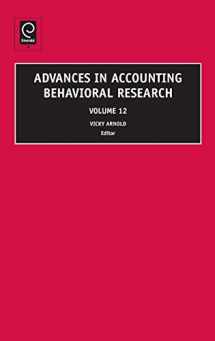
Advances in Accounting Behavioral Research (Advances in Accounting Behavioral Research, 12)
ISBN-13:
9781848557383
ISBN-10:
1848557388
Author:
Vicky Arnold
Publication date:
2009
Publisher:
Emerald Publishing Limited
Format:
Hardcover
214 pages
FREE US shipping
Book details
ISBN-13:
9781848557383
ISBN-10:
1848557388
Author:
Vicky Arnold
Publication date:
2009
Publisher:
Emerald Publishing Limited
Format:
Hardcover
214 pages
Summary
Advances in Accounting Behavioral Research (Advances in Accounting Behavioral Research, 12) (ISBN-13: 9781848557383 and ISBN-10: 1848557388), written by authors
Vicky Arnold, was published by Emerald Publishing Limited in 2009.
With an overall rating of 3.5 stars, it's a notable title among other
books. You can easily purchase or rent Advances in Accounting Behavioral Research (Advances in Accounting Behavioral Research, 12) (Hardcover) from BooksRun,
along with many other new and used
books
and textbooks.
And, if you're looking to sell your copy, our current buyback offer is $0.3.
Description
"Advances in Accounting Behavioral Research" publishes high quality research encompassing all areas of accounting that incorporate theory from and contribute knowledge and understanding to the fields of applied psychology, sociology, management science, and economics. The series promotes research that investigates behavioral accounting issues. Volume 12 begins with a research study that examines the roles of organizational justice and trust in management control system. The second study explores whether qualitative information contained in annual reports contains potential fraud risk indicators. The findings suggest that deception can be detected by analyzing management's discussion and analysis and this may provide a useful method for predicting fraud. The next three studies examine ways to improve auditor decision making. The first examines whether justification and self review can mitigate the influence of client likeability when auditors make fraud judgments. The next study examines whether auditors make different decisions under principles-based accounting standards than rules-based standards. The results indicate that auditors are more conservative and less likely to allow clients to manage earnings when the authoritative guidance is principles-based. The third study, which examines auditors' decisions in a fraud examination, compares two methods of evaluating different hypothesis when multiple revisions in the decision process occur. The results indicate that certain aids designed to support the decision-making process can help auditors improve their decisions. The next study examines the use of different types of feedback and incentives to improve decision performance when using a decision aid. The results show that decision performance improves when the decision aid is designed to provide feedback to the user. The final two studies in this volume examine the expectations of accounting students. The first is a longitudinal study examining the expectations of staff auditors over the first two years of employment in a public accounting firm. The second examines expectations regarding the skills required to succeed in accounting. The research studies reported in this volume are both interesting and insightful and should prove useful in facilitating future behavioral research.


We would LOVE it if you could help us and other readers by reviewing the book
Book review

Congratulations! We have received your book review.
{user}
{createdAt}
by {truncated_author}


